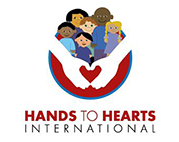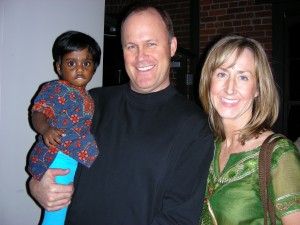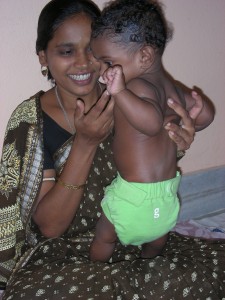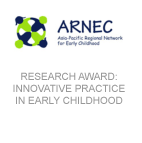An Interview By Liz Kimmerly Grover
Communications Officer
Hands to Hearts International
I recently had the chance to interview Pat Arrington, a longtime supporter of Hands to Hearts International and recent visitor to Kenya, where she actually had the chance to teach HHI’s baby massage method at an orphanage during her trip.
It was quite interesting for me to talk with her because she is an HHI supporter and sees the organization from an outside perspective. Working for HHI sometimes makes it hard for me to know how people view and process our message. Pat’s feedback definitely helped.
With a very sweet and patient voice, Pat told me a little bit about her background and that she loves HHI because of its “focus on the children” and thinks, “In any country today, we have to look at the children”. She has an adopted younger brother who lived in an orphanage until the age of seven, and she also has two adopted children.
When they were very young, she learned about the significance and joy of bonding with them. She told me how she would spend the time after their morning baths giving baby massage on a quilt in the middle of the living room floor.
“Our daughter was a month old when we adopted her and it was just such a fun time and made us very close. Seeing what love and affection can do for little ones is really why I got so excited for HHI”
Pat is a retired accountant and said that she likes to volunteer for her local church. This is how she went to Kenya last month; the church took a mission there to visit orphanages in Nairobi and the surrounding area. When they asked her why she wanted to go to Africa, she said she wanted to help the small children.
Before embarking on this journey, she watched the HHI Baby Massage DVD many times and read the “how to” massage poster that came with the DVD. She had a dozen of the posters enlarged and laminated to give away to orphanage caregivers during the trip.
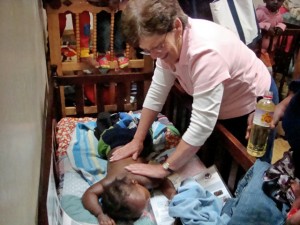
When she got there, she visited 3 different orphanages and two schools. Although conditions at one of the orphanages were very poor, Pat was able to teach baby massage at Huruma Children’s Home in Ngong, in the outskirts of Nairobi. She said, “Some of the caregivers spoke Swahili so the instructional posters really helped”, and that the baby she massaged was “so cute to watch and you could tell that she was enjoying the massage. When I massaged her tummy and chest, her arms would just fall out to her sides and she would relax”. When asked what the orphanage caregivers thought, she noticed that they were happy to give the orphans massage and that “They were very excited and took some of the massage posters home to give to their own babies a massage”.
I also asked her if she thought that any of the caregivers knew what attachment disorder is, and she responded with a definite no. However, at the same time she noticed that mothers and caregivers in Kenya were good at keeping their babies close to them; most were very loving.
Pat also visited the slums of Nairobi where people were packed in, their living conditions and proper hygiene was nowhere to be found. She recalled, “When I was in the slums, I walked into the play area that had nothing but dirt. That is where they eat, congregate, and do everything. I looked for a place where I could lay a baby down for a massage and I couldn’t find one. At the minimum, 2 babies shared one bed. The conditions were so bad that I didn’t think it would be healthy to do a massage there”.
I asked her if it was because of the danger of massaging dirt into the skin and she said yes. One 3 year old just begged for Pat to pick her up; she did and right away, the child latched around her neck. It was obvious that the child wanted love.
When asked what she thinks about HHI bringing its program to Kenya, she said, “The government doesn’t run the orphanages in Kenya, although the are registered under the Kenyan Ministry of Social Services and some have Department of Social Services Representatives on their board. They are run by nonprofit organizations meaning that HHI would need to find a way to connect with the organizations or the foundations, but Laura (HHI’s Executive Director) always finds a way! I understand and believe that HHI is needed in Kenya. I think it would be an important part of the infant care, especially for babies who have lost their parents to HIV/AIDS.”
I asked her if she had any final thoughts on HHI and she said, “I love the program. I think Laura has gotten the most ‘bang for her buck’ with what she has invested into HHI. She is remarkable.”
I totally concurred with her response. From everything I’ve seen at HHI, the most amazing part is how many women and children it has helped since 2006: 1,416 women and 12,590 children, with a speedy rate that keeps growing exponentially every month. The conversation was helpful for me to hear and made me excited to see how HHI will tailor its program when it starts in Kenya and other places in Africa. It’s an ongoing story and I know HHI’s evolution and expansion into Africa will help to bring its ravaged lands and people to a higher place.
